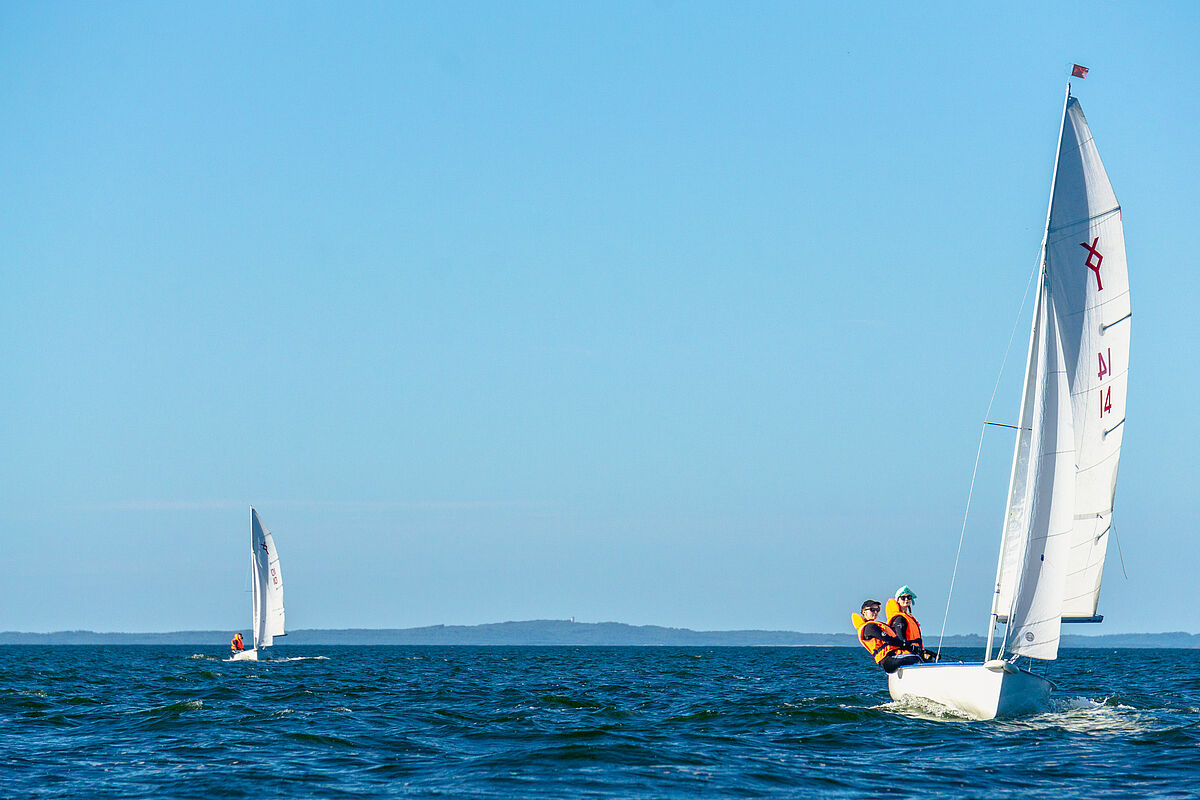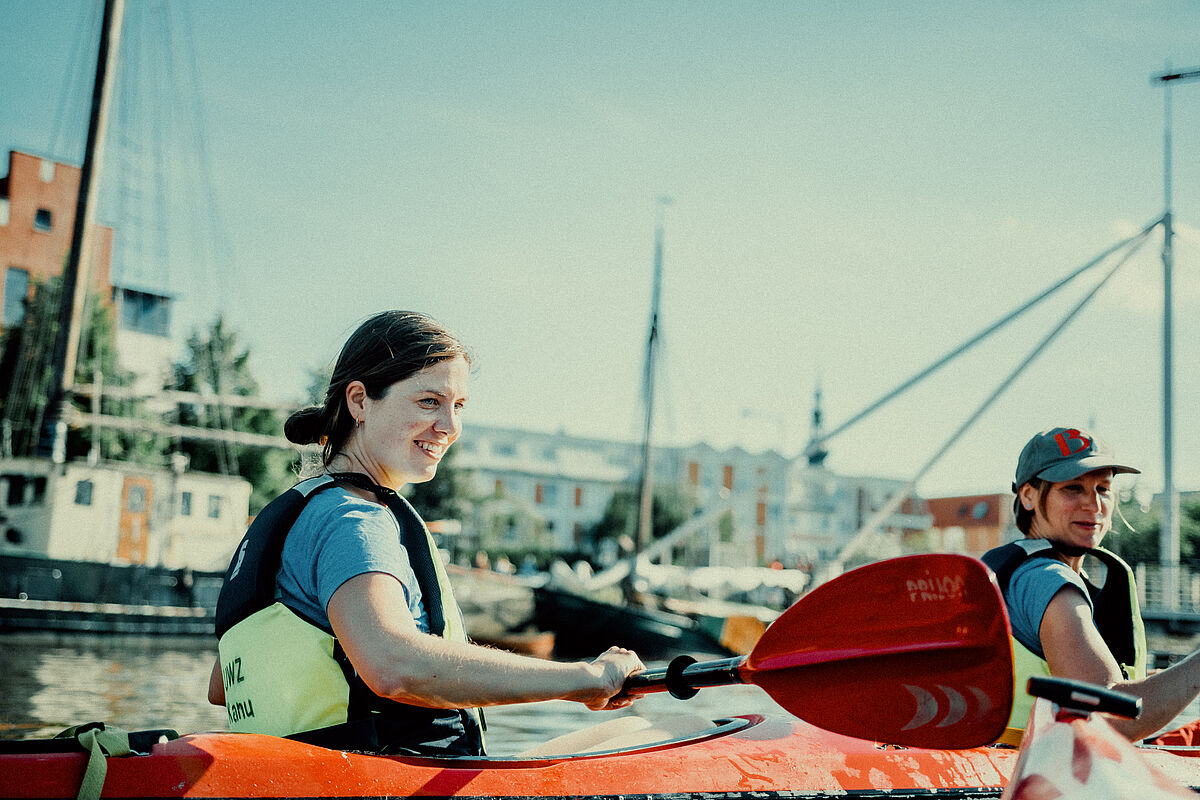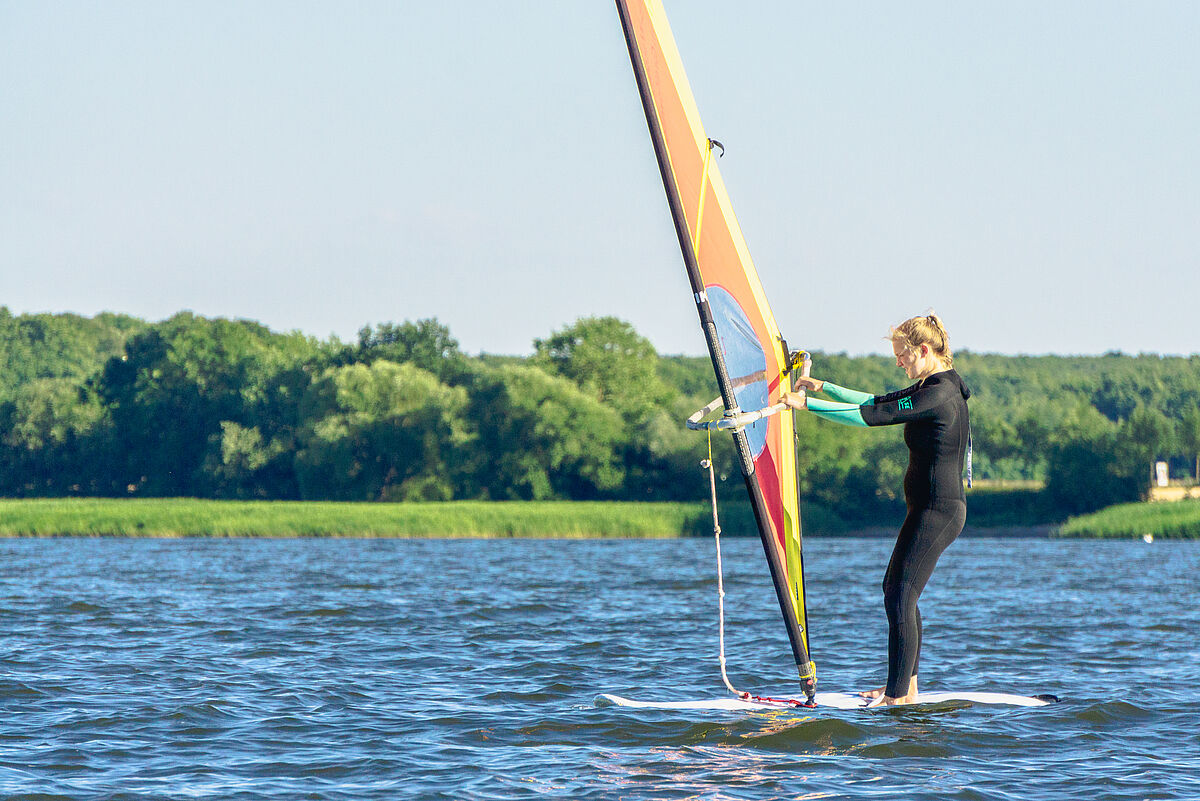Frequently Asked Questions Water Sports
Winter semester (sailing theory)
A theory course is offered during the winter semester lecture period. The course is aimed at anyone interested in learning the basics of sailing and seamanship. The course covers the theoretical principles of sailing and motorboating, navigation, laws, meteorology and knots. The theory course is not a ‘recreational boat licence course’, but is closely based on the content of recreational boat licences.
Participants in the theory course can take advantage of early registration for beginner sailing courses if a practical course is offered (at the end of the following teaching period in the summer semester). Participants in the theory course will be notified of this in good time.
Summer semester (practical sailing)
The extent to which practical courses will take place can only be announced at the end of March/beginning of April (for the teaching period) or mid-July (for the non-teaching period) (see the online course offerings of the University Sports Centre). This depends on the availability of instructors and their course offerings. There are usually three types of sailing courses (all courses are secured with an inflatable safety boat):
- For beginners: The beginner's course is aimed at anyone who would like to learn about the sport of sailing. The didactic structure of the course aims to teach the basics of sailing and its manoeuvres (courses on wind, tacking, jibing, gybing, man overboard). Active participation and a willingness to face the elements of wind and water are important here. Attendance at the theory course is not mandatory for participation in the practical beginner courses. The practical course is structured as follows: Weeks 1-3: theory and dry training; weeks 4-13: practical sailing.
- For advanced sailors: The course is aimed at anyone who already knows how to sail (courses on wind, tacking, jibing). A safety boat with an instructor accompanies the dinghies. The sailing area is the Dänische Wiek, but also parts of the Greifswalder Bodden.
- For intermediate sailors: The intermediate course builds on the beginner's course and offers the opportunity to practise and consolidate what you have learned or to learn new skills. Short trips towards the oil rigs are also possible.
Sailing clothing is not provided. Everyone taking part in a course must bring a windproof and waterproof jacket and trousers. Even if it is not raining, a ‘husche’ (spray/wave) can get you wet. It is also important to wear non-slip, abrasion-resistant footwear without a coarse tread.
Our sailing boats...
...are good-natured Ixylon dinghies, which only capsize when heeled very heavily – because this can also happen. The boats have two centreboards and are a class of boat that was designed in the former GDR.
Beginners' course – a report by Philipp Wilkening, course in the 2021/22 winter semester and 2022 summer semester...
‘Nicole's sailing course is awesome! After the theory course in the winter semester and weekly bike rides to Wieck in the cold and rainy evenings, we finally got to go out on the boats in the practical course in the summer. Always in pairs on a dinghy, the first few weeks we also had a ’tutor" on each boat who could guide us and help us in an emergency. Before setting off, Nicole always explained on the board what she had planned for us this time. Tacking, jibing, courses to the wind – anyone starting out in sailing should be prepared to study the theory as well. But all this is rewarded with an incomparable experience on the water, the feeling of moving forward without engine power and (almost) without muscle power. During the course, you learn the necessary manoeuvres, commands and procedures step by step, while Nicole stays close by with her motorboat, herding her students across the water like ducklings. And after the course, no part of the dinghy is unfamiliar. A barbecue with all the participants concludes the course, and already at this moment I am looking forward to getting back on the water and hoisting the sail. Thanks to Unisport and especially to Nicole for this experience!"
Please refer to the current course offerings page [de] of the university sports programme.
The university sports department does not offer recreational boat licences. However, participants in sailing courses can have what they have learned tested here in Greifswald-Wieck at the end of the course (course period April-July) by the ‘Examination Board for Official Recreational Boat Licences and Short Range Certificates Mecklenburg-Vorpommern' [de] as part of an official recreational boat licence examination (recreational boat licence valid for inland waters).
Information on official recreational boat licences is available online, for example, from the Examination Board of Mecklenburg-Vorpommern [de].
Dinghies can only be used within a course programme – they are not available for hire.
If you would like to hire a dinghy in Greifswald, you can do so at the ‘Segelschule Greifswald' [de] sailing school.
It is not possible to park sailing boats on the sailing boat house premises.
It is not possible to hire canoes. However, from the 2024 summer semester onwards, we will be offering free canoe training, where you can paddle independently at bookable training times outside of a regular canoe course.
It is not possible to hire rowing boats, nor are there any plans to offer this service.
Storage of equipment is not available.
The courses offered depend primarily on the availability of instructors. In addition, the university sports programme does not have the facilities for some sports, such as kite surfing.
Unfortunately, we are forced to adjust some course prices for the 2022 summer semester. Our goal remains to keep water sports affordable for students on a budget. Guided sailing lessons are still available for less than €10 per hour.
Nevertheless, for financial (internal cost recovery) and tax reasons, we have to charge different prices for some courses.
However, the fees are still subsidised by the university, the AStA and the state, in some cases by up to 50%.
In particular, for all persons who neither study nor work at universities in Mecklenburg-Western Pomerania (referred to as external participants in the programme), we have to charge the full cost, as they are not legally entitled to benefit from internal subsidies.
We ask for your understanding and wish you lots of fun and wonderful experiences.



